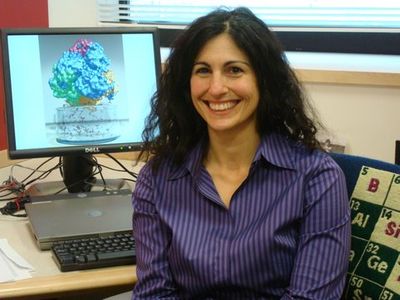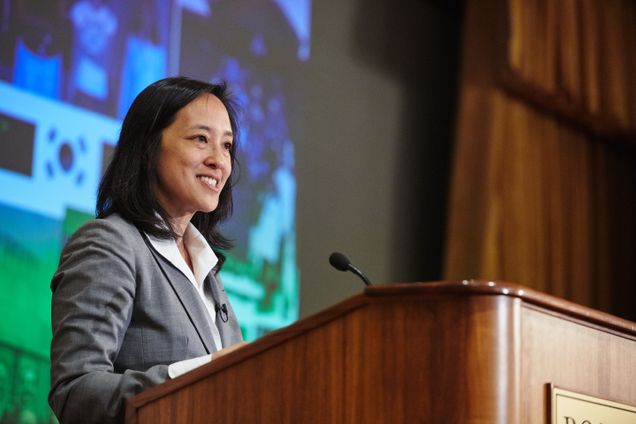Faculty News
Dr. Khalil Featured Speaker at Nexus of Life Sciences and Engineering Symposium

Dr. Sgro Receives Moorman-Simon Interdisciplinary Career Development Professorship
From the ENG News post by Joel Brown, BU Today:
Allyson Sgro, a College of Engineering assistant professor of biomedical engineering, has been chosen for this year’s Moorman-Simon Interdisciplinary Career Development Professorship, which supports the work of a junior faculty member whose scholarship spans more than one school or college. Sgro’s work bridges biology and engineering and draws on her background in chemistry and biophysics, exploring how cells work together and make group decisions to perform complex behaviors such as assembling into a tissue, forming a biofilm, or healing a wound.
“I have some really fantastic students who are excited about where this work is taking us, and I’m hoping to invest the stipend in training them, to give them the kind of education I had, to go to conferences and meet people from different fields,” says Sgro, who joined BU in January and whose lab recently moved into the new Center for Integrated Life Sciences & Engineering. Sgro says her professorship, funded by BU trustee Ruth Moorman (CAS’88, SED’89,’09) and her husband, Sheldon Simon, “will also allow us to investigate ideas we have that are a little unconventional between fields, that we don’t have more conventional support for, to push into new areas.”
Sgro received a master’s and a PhD in chemistry from the University of Washington and completed postdoctoral training at Princeton.
Dr. Gilmore Gives Keynote Talk at the 15th Annual Asian Conference on Transcription in Malaysia
In early August, Professor Tom Gilmore gave the invited keynote talk at the 15th Annual Asian Conference on Transcription in Penang, Malaysia. Gilmore’s talk, “A Billion Years of Transcription Factor NF-kB,” covered his lab’s research on the role of the NF-kB protein in immune diseases from simple marine invertebrates to humans.
Dr. Dunlop Receives Young Investigator Award
 Assistant Professor Mary Dunlop (BME) is the 2017 recipient of the ACS Synthetic Biology Young Investigator Award. The award recognizes the contributions of scientists who have made a major impact on the field of synthetic biology, early on in their careers.
Assistant Professor Mary Dunlop (BME) is the 2017 recipient of the ACS Synthetic Biology Young Investigator Award. The award recognizes the contributions of scientists who have made a major impact on the field of synthetic biology, early on in their careers.
“It is a great honor to receive the ACS Synthetic Biology Young Investigator Award this year,” said Dunlop. “Synthetic biology is an emerging field with many excellent early career scientists. I am thrilled to be recognized for my research group’s efforts on engineering biological feedback control systems.”
Dunlop joined the faculty at Boston University in January 2017. Previously, she was an assistant professor in the College of Engineering and Mathematical Sciences at the University of Vermont. Her research focuses on systems and synthetic biology with a focus on feedback in gene regulatory networks. The Dunlop Lab studies naturally occurring examples of feedback to understand their implications for survival in changing conditions to understand how microorganisms use feedback to respond to changes in their environment. She also engineers novel, synthetic feedback control systems. To support her research she has three current grants: a National Science Foundation CAREER Award; a National Institutes of Health R01; and a Defense Advanced Research Projects Agency award.
Dr. Celenza Appointed Director of UROP
BU Biology Professor John Celenza has been appointed as the Director of the Undergraduate Research Opportunities Program (UROP) at Boston University. UROP was started in 1997, and since it began, it has connected more than 4,000 BU undergraduates to a range of extraordinary research experiences across the natural sciences, medicine, the arts, humanities, and social sciences, both here in Boston and abroad.
As a Professor of Biology and Directory of the Program in Biochemistry and Molecular Biology, Professor Celenza has long been involved in UROP as a mentor as well as a member of the award review committee. Professor Celenza's goals as Director of the UROP program include further developing the program's multidisciplinary reach and impact, as well as creating and supporting opportunities that align with the BU Hub curriculum.
Congratulations to Professor Celenza!
Dr. Karen Allen Awarded 3 Grants in the 2016/2017 Academic Year

Professor Allen was awarded 3 grants in the 2016/2017 academic year. One was awarded by the National Science Foundation (NSF), while two were awarded through the National Institute of Health (NIH), one directly and the other via a subaward agreement with the Scripps Research Institute. The Scripps subaward will study diverse approaches to treating botulism and is titled “Trehalose-6-phosphate phosphatase inhibitors as anti-helminthics” and is a yearlong award. Her NIH Award is a 2 Year Award for that will study phosphatase inhibitors is titled: “Trehalose-6-phosphate phosphatase inhibitors as anti-helminthics.” The NSF Award is a Collaborative Award with Professor Barbara Imperiali of MIT and is titled “Collaborative research: Development of a platform enabling analysis of membrane protein interactions” and also includes 2 Years of research support.
Congratulations to Professors Allen and on her productive year!
Dr. Adrian Whitty Awarded 4 Years of Funding from the NIH
Professor Whitty was awarded a 4 Year grant by the National Institute of Health (NIH) to further his studies of NF-kB Modulators. The title of the Research Project is: Structure and Mechanism of NF-kB Essential Modulator (NEMO).
This funding will allow Professor Whitty and his Co-PIs Professors Karen Allen of Chemistry and Thomas Gilmore of Biology to advance our understanding of the signaling scaffold protein NF-κB essential modulator (NEMO), a component of the inhibitor of κB kinase (IKK) complex, which is a key regulatory node for NF-κB signaling. In addition to NEMO playing a role in the chronic hyperactivity of NF-κB in human diseases, mutations in NEMO are found in several human immunodeficiency diseases. The long-term goals of the project are to understand how scaffolding proteins such as NEMO use conformational change to regulate the functional interactions between the signaling proteins that are bound to them, to elucidate the structural basis for disease-causing mutations in key regions of NEMO, and to identify new target sites for small molecule drugs that modulate NEMO activity.
Congratulations to Professors Whitty, Allen and Gilmore and their research team!
Dr. Naya to serve on NIH Study Section
BU Biology Associate Professor Francisco Naya has been invited to serve as a permanent member on the Cardiovascular Differentiation and Development (CDD) study section at the NIH. Members are selected on the basis of their demonstrated competence and achievement in their scientific discipline as evidenced by the quality of research accomplishments, publications in scientific journals, and other significant scientific activities, achievements and honors. Study sections review grant applications submitted to the NIH, make recommendations on these applications to the appropriate NIH national advisory council or board, and survey the status of research in their fields of science. These functions are of great value to medical and allied research in this country.
Dr. Joyce Wong Presents De Lisi Distinguished Lecture

Read the full article in ENG News.